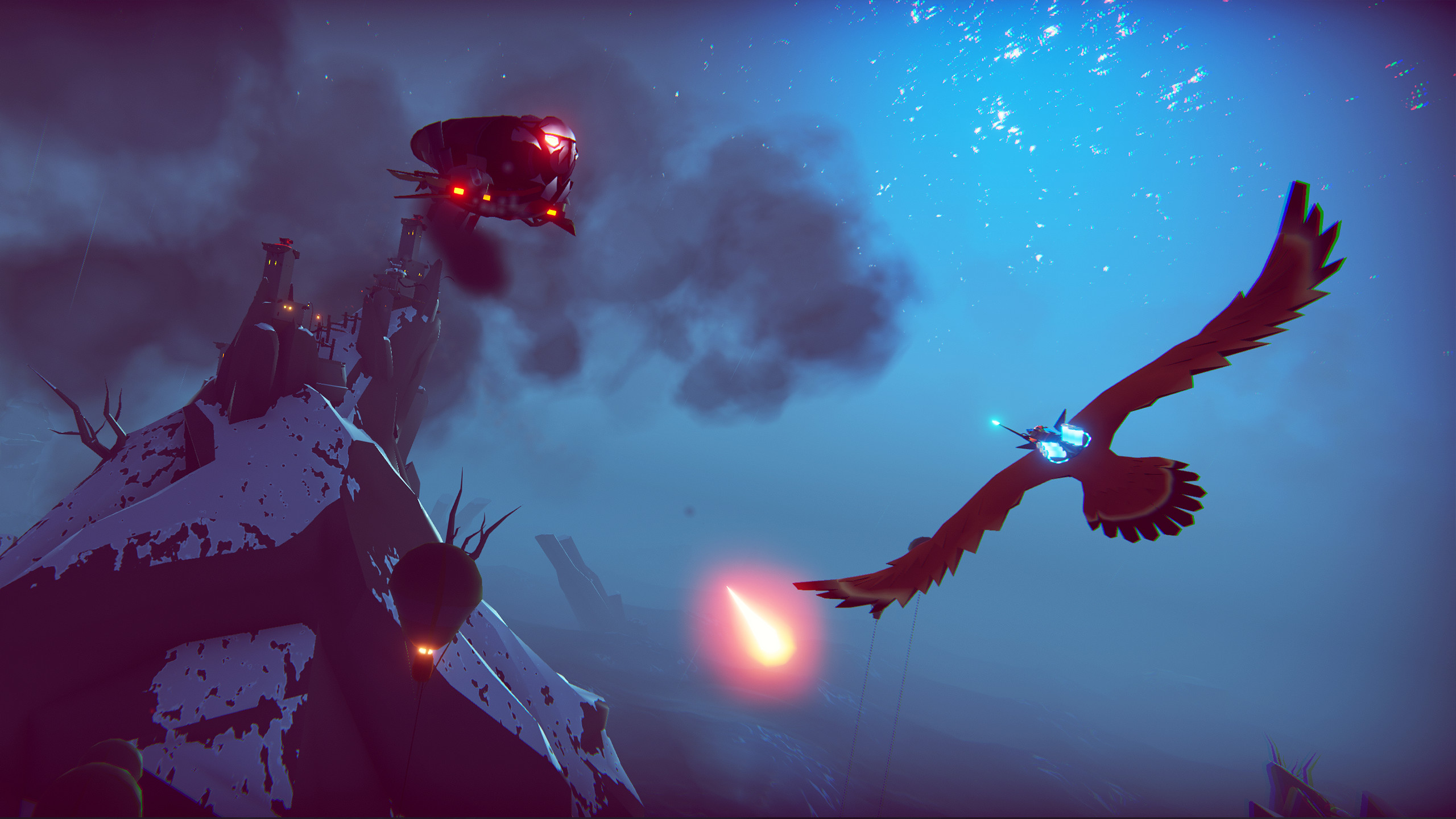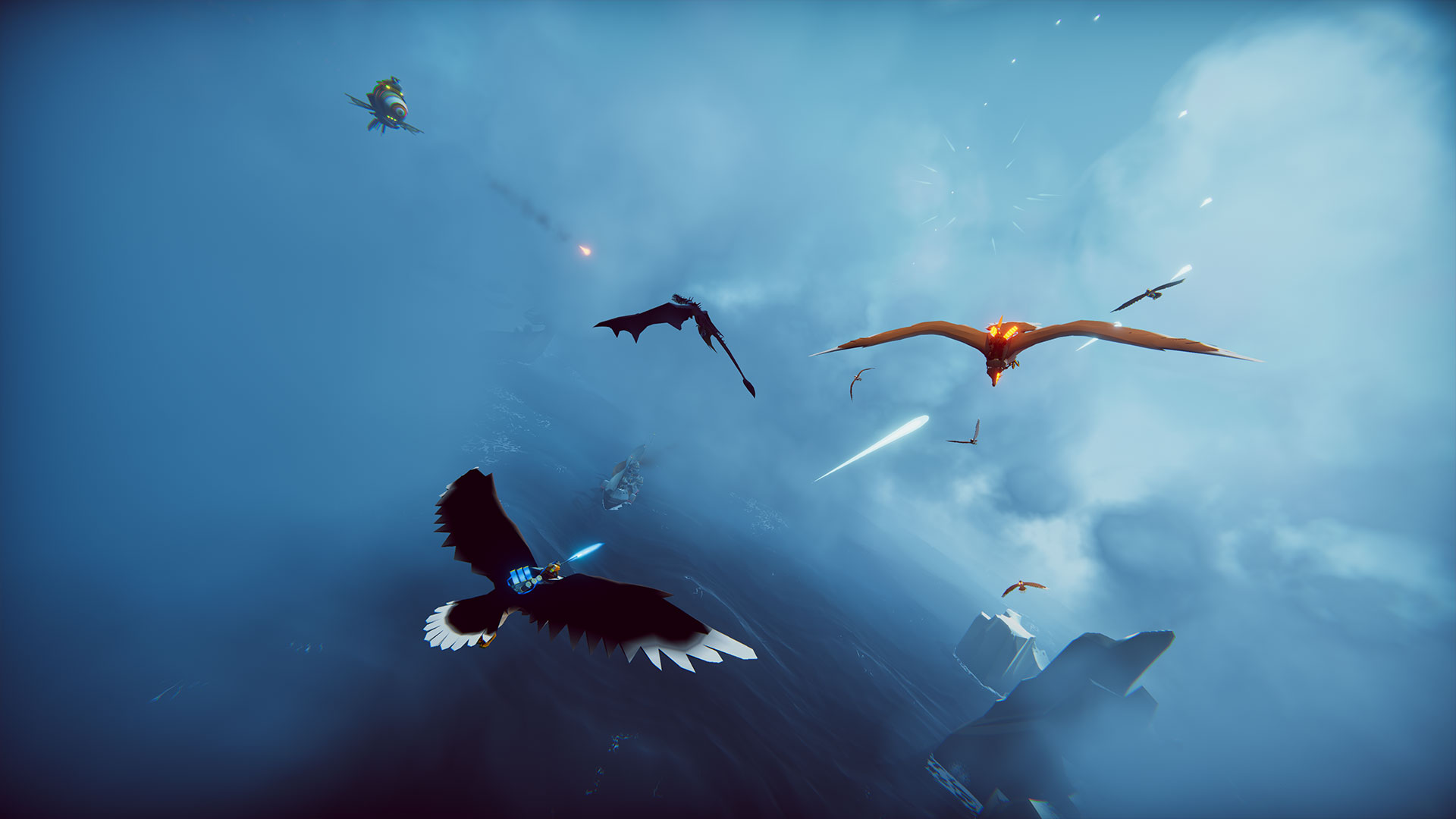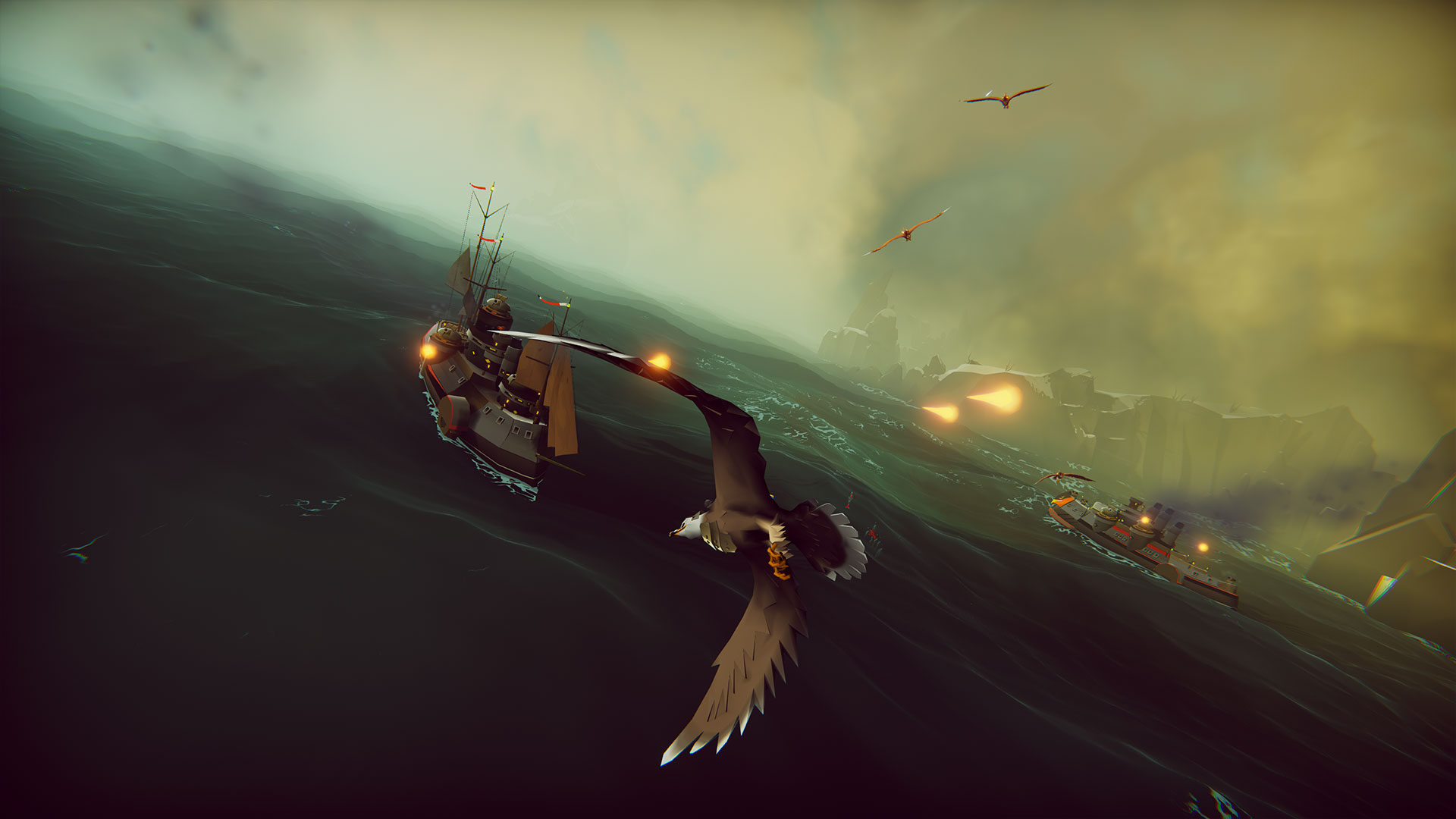GamesRadar+ Verdict
The Falconeer boasts an intriguing story and a hauntingly beautiful setting, but is hampered by repetitive missions in an empty open world.
Pros
- +
Twisty political machinations and intriguing lore
- +
Beautifully mysterious world
Cons
- -
Campaign is hampered by repetitive mission design
- -
Open world design has little to offer
- -
Aerial combat remains too simplistic
Why you can trust GamesRadar+
The Falconeer is an aerial combat game against a backdrop of acrylic-painted skies and Game of Thrones-style intrigue. Its one-note gameplay ensures that its waterlogged setting isn’t the success it could be, but the desire to learn more about its richly imagined world kept me interested throughout my 19 hours with the game.
You are the titular Falconeer, a gun-toting pilot gripping the reins on the back of a massive bird and running errands for a host of island nations in a water-covered world. Most of the game involves flying out to an area to accomplish some goal, getting ambushed when you reach your destination, then dogfighting your way back. The flight controls feel graceful and your bird controls with a light touch.

Release date: November 10
Platform(s): Xbox Series X/S, Xbox One, PC
Developer: Tomas Sala
Publisher: Wired Productions
Combat is less impressive and is generally pretty one-note. In most aerial combat games you can switch between your main attack and a more powerful special. But, in The Falconeer, you only have a basic shot (which feels disappointingly peashooter-ish) and, occasionally, the opportunity to order your wingman to shoot a target for you. This lack of complexity makes the missions feel repetitive over time. Your moveset just isn’t dynamic enough to justify the hundreds of dogfights you’ll blaze through across The Falconeer’s fairly lengthy campaign.
That said, the game is buoyed by its vibrant world and rich sociological storytelling. This is a game that - hence the Game of Thrones comparison - is invested in showing every side of its world’s story, casting you as an agent for change on opposing sides of a conflict. To wit, I actually lied up top. You’re not just playing as one falconeer. You’re actually playing as several falconeers. The game switches perspective as it progresses, putting you in the shoes of different soldiers hailing from different islands with distinct cultures across the massive Ursee. Regardless of which House you’re working for in a given chapter, The Falconeer’s gameplay is the same. You accept main missions to advance the plot, and take on side missions to rack up currency that you can use to improve your character’s weapon and stats.
Water, water, everywhere

The Falconeer’s world is almost entirely covered in water, and missions often find you flying over long stretches of it, traveling from your home to a neighboring island and getting in scraps with pirates or rival factions along the way. The islands that dot the water are populated by cities, each with its own culture which is fleshed out with some surprisingly great lore. Cleftspire, for example, the home of the illustrious House Mercier and its iron mines, is being consumed from within as Mercier’s naval demands eat away at its iron and shrink the island to a fraction of its former self. Or the Saladmounts, the wealthy family that has made a fortune on lumber, hewn from the massive mushrooms that bloom in places across the sea. Most memorable, though, is The Maw, a mysterious trench that runs across half the length of the Ursee. The gravity-defying wound causes a dip in the water, but is not filled with water itself; dry and haunted, instead, by gravel and dead trees.
From a story perspective, The Falconeer is just as intriguing, with secret betrayals and outrageous backstabs among the Ursee’s key players. I was especially impressed by how well one moment in the early game landed. After your Falconeer, representing the mining island of Dunkle, runs into pirates while on the way to make a delivery to a nearby island, the island’s representative blames Dunkle for the attack and refuses to do business with you going forward. The capricious unfairness of the decision and the genuine outrage with which your wingman replies to the slight help sell the emotional stakes of the political machinations the game’s story is built on.
But, The Falconeer has a few big issues that made uncovering its story more of a chore than it should have been. First, and most fixable, its checkpointing system is decidedly old school. Missions are often lengthy, multi-step affairs, which task you with piloting your falcon across great swaths of Ursee. But, on the default difficulty setting, your falcon is fragile and battles can go sideways really quickly. More than once, I died by accidentally glancing off an enemy aircraft, and lost 15 minutes of progress as a result. I often found myself making it through the first few steps of a mission, then quickly having my hopes dashed as I messed up in the final bit. You can knock the difficulty down to easy at any time, and that causes your falcon’s health to regenerate at a much faster pace. But, it also removes much of the challenge and tension from the game’s dogfights, so it’s a bit of a lose-lose situation.
And not enough to fight in

Secondly, and more damning, The Falconeer’s world of water is mostly empty. It’s a stunning setting, to be sure. The sun on the water and the hazy clouds have a painterly quality that constantly impressed me. Sometimes the sky is dark and red; sometimes the sun is shining against light, translucent clouds. Some of the more epic battles took place during the black of night, with only the glow of bombs and energy ammo to illuminate the darkness. And the music has a dark, haunting synthiness that perfectly captured the lonely feeling of a thunderstorm approaching.
Mood aside, though, there just isn’t much to do. Side missions fall into a few distinct categories (go kill a specific enemy, go find a specific object) but there’s little variety among them. That’s basically all there is to do. Open-world games tend to be at their best when they can offer a balance of main and side content; enticing you back and forth between the stuff you should be doing and the stuff you want to take a break and goof around with. But, in The Falconeer, the only thing that felt like it was worth doing was the main missions. The Ursee does contain interesting landmarks and you will find cool things if you take time to explore. But, there is little incentive beyond that to venture off the critical path. And, anyway, you may enjoy the world more if you allow the main story to reveal its secrets to you in context.
Those problems notwithstanding, The Falconeer is a moody, impressively realized piece of fantasy. I just wish that the complexity of its gameplay could match the depth of its world. Instead, expect to spend plenty of time wading in the shallows.
Reviewed on PC.


